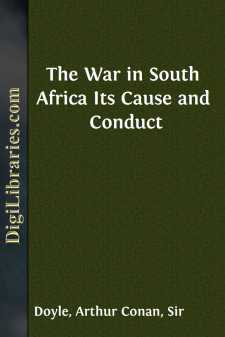History
- Africa
- Americas (North Central South West Indies) 50
- Ancient 68
- Asia 58
- Australia & New Zealand 8
- Canada 41
- Caribbean & West Indies 1
- Civilization 20
- Eastern Europe 12
- Europe 310
- Expeditions & Discoveries 60
- General 77
- Historical Geography 1
- Jewish 9
- Latin America 3
- Medieval 8
- Middle East 13
- Military 248
- Revolutionary 8
- Study & Teaching 5
- United States 353
- Western Europe 56
- World 13
Africa Books
Sort by:
by:
F. W. Reitz
INTRODUCTION. BROTHER AFRICANDERS! Once more in the annals of our bloodstained history has the day dawned when we are forced to grasp our weapons in order to resume the struggle for liberty and existence, entrusting our national cause to that Providence which has guided our people throughout South Africa in such a miraculous way. The struggle of now nearly a century, which began when a foreign rule was...
more...
It is impossible to appreciate the South African problem and the causes which have led up to the present war between the British Empire and the Boer republics without some knowledge, however superficial, of the past history of South Africa. To tell the tale one must go back to the beginning, for there has been complete continuity of history in South Africa, and every stage has depended upon that which...
more...
CHAPTER I FIRST VOYAGE TO SOUTH AFRICA—CAPE TOWN. "Oh that mine adversary had written a book!"—JOB xxxi. 35. The above words, written by one of the greatest philosophers of olden time, have often impressed me, and I have frequently quoted them when asked why I did not write an account of the interesting travels and adventures I have had in my life. It has therefore required a great deal of...
more...
THE REVENGE OF THE MOORS. For more than three centuries the trading nations of Europe were suffered to pursue their commerce or forced to abandon their gains at the bidding of pirates. From the days when Barbarossa defied the whole strength of the Emperor Charles V., to the early part of the present century, when prizes were taken by Algerine rovers under the guns, so to say, of all the fleets of...
more...
Charles Francis Adams, Esq.,Boston, Massachusetts. Dear Sir: I have been handed a pamphlet written by you entitled "The Confederacy and the Transvaal," the burden of which is, that the Boers ought not to continue their irregular guerilla struggle against England, because it is destructive of themselves and wasteful of England's resources; or to use your own words "the contest drags...
more...
by:
Samuel Johnson
INTRODUCTION. Jeronimo Lobo was born in Lisbon in the year 1593. He entered the Order of the Jesuits at the age of sixteen. After passing through the studies by which Jesuits were trained for missionary work, which included special attention to the arts of speaking and writing, Father Lobo was sent as a missionary to India at the age of twenty-eight, in the year 1621. He reached Goa, as his book...
more...
CHAPTER I INTRODUCTORY The declaration of war—Sir George White and the defence of Natal—The force at Glencoe—Battle of Talana Hill—General Yule's retirement—Battle of Elandslaagte—Useless victories—Enemy's continued advance. Before taking up the history of the siege proper it will be well here to pass briefly in review the events which led up to the isolation and investment of...
more...
CHAPTER I STEAMING SOUTH R.M.S. 'Dunottar Castle,' at sea: October 26, 1899. The last cry of 'Any more for the shore?' had sounded, the last good-bye had been said, the latest pressman or photographer had scrambled ashore, and all Southampton was cheering wildly along a mile of pier and promontory when at 6 P.M., on October 14, the Royal Mail steamer 'Dunottar Castle' left...
more...
by:
Johanna Brandt
THE PETTICOAT COMMANDO CHAPTER I THE SCENE OF ACTION When, on October 11th, 1899, shortly before 5 o'clock in the afternoon, martial law was proclaimed throughout the Transvaal and Orange Free State, South Africa, and after the great exodus of British subjects had taken place, there remained in Pretoria, where the principal events recorded here took place, a harmonious community of Boers and...
more...
CHAP. I. Bethulie Concentration Camp, August, 1901. Wednesday, August 21.—Arrived station 8.30 a.m. (from Bloemfontein); tedious delay; no pass to village obtainable, official in village for breakfast; number of refugees in same train, among them a sick girl, with fever: "Pappie, Pappie, ach mij ou Pappie!" ("Daddy, daddy! O my dear daddy!" Thus she cried whenever she was touched, as...
more...











